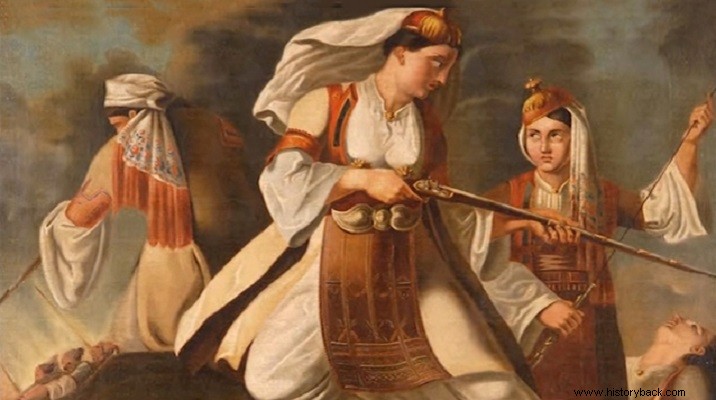
They actively participated in the struggle, formed their own groups, bought secret weapons and "threw" their ships into the Revolution. The female captains of 21 dominate history and their rich action is transferred to the next generations, through the typical examples of Laskarina Bouboulina and Domna Vizvizi, the captain of Ainos.
Boubulina starred in the events of the time, the compromises and disputes of the fighters in Tripolitsa. She moved alone after getting permission from her competitors to compromise and divide the spoils. Domna Vizvizi , also known as the captain of Ainos, took part in the fight with her whole family, their ship Kalomira with its many cannons and many sailors. He participated in all the local uprisings of Halkidiki as well as in the Philiki Etairia fund while transporting munitions and Emmanuel Papa himself to Hydra.
In the role of a spy, Marigo Zarafopoula from Constantinople, operated in Tripolitsa and Nafplio. She was initiated into the Friendly Society, saved many fighters, gave her property to Hydra so that the ships could be equipped and sailors and fighters paid, while she also financed Faviero's campaign in Karystos. Among the female warriors who starred in the fight is the distinctive form of Manto Mavrogenous , fighter of Parochial Hellenism originally from Mykonos, who gave all her property for the fight. Asimina Boura also dedicated herself to the race , whose form has been captured by Philhellenic painters with a great sword, in the battle of the Acropolis.
The activity of the women of the diaspora who were scholars, translators, writers and translated the works of the Enlightenment, spreading its ideas to the enslaved Hellenism, was essential in terms of the transfer to the Greek area of the ideas of the Enlightenment. Elisavet Kastritsiou from Epirus and Rallou Karatza they were born and lived in Romania and Italy, they spoke two or even three languages, they translated the texts and participated in the events while their action is recorded in the newspapers and Philhellenic paintings.
These and several other women of the Revolution, such as the captain Konstantina Zacharias and Stavriana Savvaina from Sparta is presented by Ifigenia Vamvakidou, professor of Modern Greek History and Culture, of the School of Social Sciences and Humanities of the University of Western Macedonia. She characteristically mentions that "all these women exist at that time as historical and political subjects and not only as victims and slaughtered who existed in every social and national liberation revolution".
"Who was supporting all the fighters? Who produced gunpowder? Who transported the munitions? Who fed the families? Who distributed the spoils after every battle?” he asks rhetorically and points to the presence of many women and strong groups of women, who were daughters, mothers, sisters, wives. The presence of all these is revealed by today's historians through documents, evidence, sources, the general archives of the state, sculptures, engravings and paintings.
To the question of whether the role of women in the revolution was perceived then, he answers in the negative and mentions that this was done individually but not in all cases. "Many women but also many male fighters died without a pension" he says and emphasizes that a typical case was that of Domna Vizvizi, who was forced to separate her child and send it to France where bourgeois women, rich and Philhellene, had gathered the orphans children of war. "Most women suffered because there was no institution and they had no rights.
Women had no property, so all sailors' widows, if they did not remarry, lost their property to their brothers, their descendants, or to the ministry itself, the Ministry of the Navy, which would take their ship and make it a bulllot , prankster. After all, at that time there was no divorce, no marriage, nor all these legal elements that exist and are recognized today," he adds.
In any case, Mrs. Vamvakidou emphasizes the importance of raising the issue today as, as she says, "it seems that we are still claiming rights and demands of the French Revolution, for freedom, equality, education. We still claim a rule of law and gender and women as well as men are very important in history because they shape the historical social narrative, a narrative of peace".
This message is, after all, always relevant since, as he points out, "war produces brutality and we can highlight peace through the role of women who again need support, whether they are warriors, refugees, uprooted, mothers, wives, sisters or for political figures, scholars and translators".
SOURCE:P. Yultsi, APE-MPE
